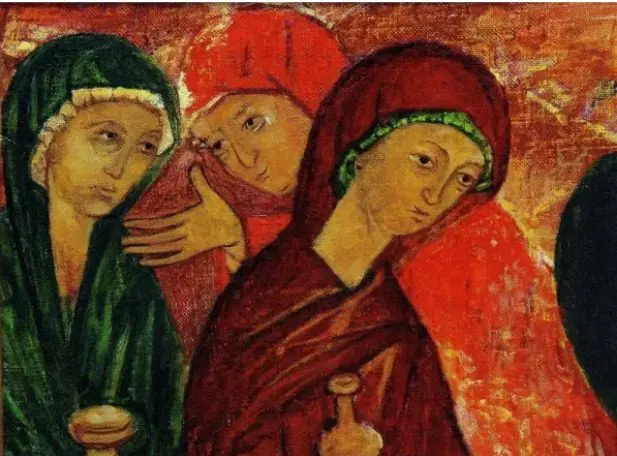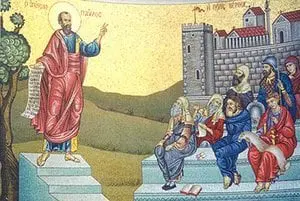The change of political regime in Eastern Europe inevitably affected the entire life of the people in these countries, including the religious one. Feeling free to express their beliefs and convictions, they also turned to the traditional Orthodox faith of their ancestors. And church officials suddenly faced unprecedented challenges. People’s interest in church life exceeded the physical capabilities of the clergy. Thus, in their quest to receive new believers and care for them, the clergy failed to carry out their preaching mission. So the paradox came that because of a lot of work they could not do their main job.
In some of the churches, especially in the Bulgarian Orthodox Church, there is an acute shortage of clergy. And yet our church fails to engage other people to help the clergy in their difficult work. Human resources are not enough for purely cultic duties, let alone the spread of faith and social activity. And it is in these two areas that female deacons would be very useful. However, conservative church leaders do not even dare to think about such a solution.
Why, after all, does the title speak of a post-communist milieu? Because the environment always affects people’s thinking. The clergy of the Orthodox Churches in Eastern Europe, accustomed since the decade of the communist regime to think and work primarily in the direction of preserving the faith and church practice, now continue to oppose any ideas of change. Moreover, such ideas and their bearers are immediately denounced as “modernist,” “ecumenical,” in other words, “anti-church.”
In any case, the issue of deacons is on the agenda of the Orthodox Church as a whole, even if the individual synods of the local Orthodox churches do not pay attention to it. Moreover, this issue is not the result of pressure from Orthodox women and their possible claims to enter the clergy of the Church, but is caused by the awareness that the ministry of women, in whatever form it is accepted and introduced, is vital. for the activity of the Orthodox Church.
Little girls helping in worship at a temple of the Patriarchate of Antioch in Germany. With this, this patriarchate contributes to the revival of the ancient practice of participation of deacons in Orthodox worship.
As reported at dveri.bg, the last few years, the priest who served in the chapel “St. Kliment Ohridski ”at the Faculty of Theology at Sofia University, also introduced the participation of girls in stichars (or stichar-like slaves) during the small and large entrance of the liturgy, where whole families with their children came to church on Sundays and holidays. Together with the boys, the girls form an impressive procession of fifteen to twenty children. And because it is not advisable for all these children, sometimes three or four years old, to carry candles, a set of dozens of medium and small icons has been created, which children wear in front of their chests during entrances.
Of course, some clarifications need to be made:
1) these girls do not enter the altar, and their service is only in the common part of the temple (nave);
2) they add to the number of boys who help in a similar way and have the opportunity to enter the altar;
3) Girls do not put a plow on their slaves, as boys and men do.
This is an innovation that I have not seen elsewhere in our country. According to the priest who initiated the girls’ participation, he did so after a Christmas party where boys and girls were dressed as angels. He came up with the idea that children with these slaves could be engaged during part of the holy liturgy, because it is difficult to keep the children’s attention during the long Orthodox services anyway.
I must say, however, that some are outraged by this innovation because it was “not acceptable” for girls to serve in the church. And here we come to the paradox: in the Orthodox Church, especially in the Bulgarian Orthodox Church, the majority of worshipers are women, but they are not recognized the right to participate at least as deacons, servants (and at the altar). Of course, there are some exceptions such as the use of older women for altar service and even more for work in the temple as clerics, candle sellers, cleaners. Women are also very active in parish life, in singing during worship, in educational work, in social work and many other areas of church life, which we usually call the “Marta’s part”. But “true Orthodox” Christians and clergy could not even imagine that a woman could be introduced to the lowest stage of the clerical ministry.
In this case, arguments from the history and practice of the Orthodox Church can do little to help. Because the guardians of “tradition” are not interested in arguments, they know only one thing: this cannot happen – to ordain women deacons! They don’t care if and why they can, they only know their “can’t”. Those who claim the opposite are modernists, certainly ecumenists and, in general, traitors to Orthodoxy.
They are also not interested in arguments such as that there are not enough men for clerical ministry, that it is good to include women in the deaconry degree, because women work easier, better and more successfully with women (the majority of worshipers as mentioned). They accept, of course, that man and woman are equal vessels of God’s mercy and grace, but “” cannot. “
How do you see the future of this issue among the leading clergy of the Bulgarian Orthodox Church? In the beginning, “everything is fine and it must go on like this,” say the bishops and many of the rest of the clergy, as well as many active Christians. Because the Orthodox are convinced, as in the decades of state atheism, that the main duty of every Orthodox Christian is to preserve, to preserve the Orthodox heritage. And the mission, that is, that important command of the Lord Jesus Christ, “Go and make disciples of all nations, baptizing them in the name of the Father and of the Son and of the Holy Spirit, and teaching them to keep all that I have commanded you” (Matt. 28: 19-20)? There is no meaningful answer.
I do not think that any initiative can be expected in this regard from the leadership of the BOC. And there are no conditions at a lower level to offer anything.
In short, there is no actual discussion on the issue of women deacons.
And yet: if something is offered at the pan-Orthodox level, would it be accepted in our country? Difficult question. To get an answer with a smile, I will say: is it possible to accept anything on an all-Orthodox level, at least in the current situation?
Thus, the worshipers in our Orthodox churches will continue to be a female community led by one man!







